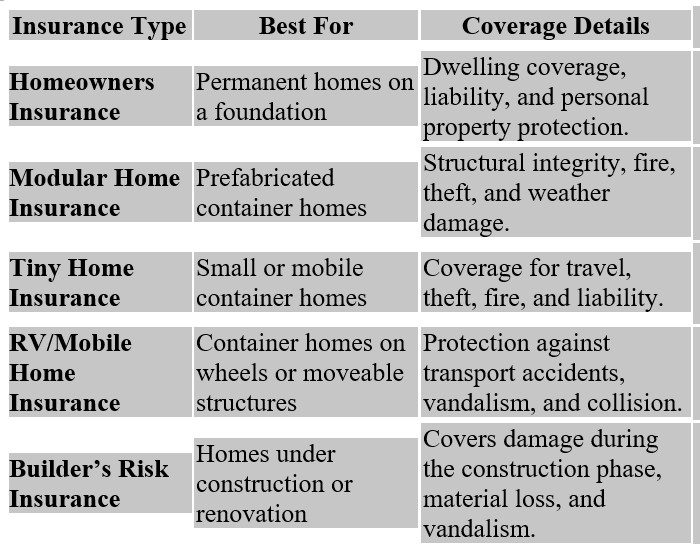Insurance for Shipping Container Homes: Everything You Need to Know
Shipping container homes are becoming increasingly popular due to their affordability, sustainability, and durability. They offer a cost-effective alternative to traditional housing, making them attractive for homeowners, investors, and off-grid living enthusiasts. However, insuring a shipping container home is different from insuring a traditional house due to its unique structure and classification.
Many insurance companies do not offer standard homeowners insurance for non-traditional homes, meaning finding the right container home insurance can be challenging. Factors like building codes, zoning laws, structural integrity, and off-grid status can all impact insurance eligibility and premium costs.

Why is insuring a shipping container home important?
Without the right insurance policy, you may be financially responsible for repairs, replacements, or legal liabilities in case of:
🔥 Fire damage
🌪️ Natural disasters (hurricanes, floods, earthquakes)
🚨 Theft or vandalism
⚡ Electrical malfunctions & safety hazards
🏗️ Structural integrity failures
💡 If you’re planning to build, buy, or insure a shipping container home, this guide will help you understand the different types of insurance coverage, the factors that affect insurance premiums, and how to find the best policy to protect your investment.
What Makes Shipping Container Home Insurance Different?
Unlike standard homes, container homes fall into a gray area in the insurance industry because they are classified differently depending on their permanence, foundation, and modifications.
📌 How insurance providers classify shipping container homes:
✅ Permanent structures – Qualifies for traditional homeowners insurance if built on a permanent foundation and meets local building codes.
✅ Modular or prefabricated homes – Some insurers treat container homes as modular dwellings, making it easier to find coverage.
✅ Tiny homes or mobile homes – If your container home is under 400 sq. ft. and/or transportable, it may be covered under tiny home insurance or mobile home insurance.
✅ Off-grid or alternative homes – Homes that are not connected to utilities may need specialized policies to cover solar panels, rainwater collection systems, and septic tanks.
💡 Because of these differences, finding insurance for a shipping container home requires working with specialized insurance providers who understand alternative housing.
Types of Insurance for Shipping Container Homes
There are several types of insurance coverage options for container homes. The right policy depends on how your home is built, its location, and how you plan to use it.

Homeowners Insurance for Shipping Container Homes
🔑 Best for: Permanent, legally zoned container homes.
✅ Covers:
✔️ Dwelling coverage – Protects the physical structure from fire, water damage, windstorms, and theft.
✔️ Personal property coverage – Covers furniture, electronics, and belongings inside the home.
✔️ Liability coverage – Pays for medical and legal costs if someone is injured on your property.
❌ Challenges:
🚨 Some insurance providers do not cover non-traditional structures.
🚨 The home must comply with local building codes to qualify for standard coverage.
💡 To increase your chances of approval, make sure your shipping container home is on a permanent foundation and meets residential zoning laws.
Modular Home Insurance
🔑 Best for: Prefabricated or factory-built container homes.
✅ Covers:
✔️ Structural integrity & building coverage
✔️ Fire, water, and weather-related damages
✔️ Liability protection for injuries or accidents on the property
💡 Some insurance companies classify container homes as modular homes, making it easier to obtain coverage.
Tiny Home Insurance
🔑 Best for: Small container homes under 400 sq. ft.
✅ Covers:
✔️ Theft, fire, and property damage
✔️ Liability coverage for accidents on the property
✔️ Some policies cover travel-related risks if the home is mobile
💡 If your container home is on wheels, it may need a tiny home insurance policy instead of traditional homeowners insurance
Mobile Home or RV Insurance
🔑 Best for: Shipping container homes on wheels or classified as moveable structures.
✅ Covers:
✔️ Accidents & damages during transport
✔️ Liability for injuries on the property
✔️ Fire, weather, and theft protection
💡 If your container home is designed for transport, you may need an RV or mobile home insurance policy.
Builder’s Risk Insurance
🔑 Best for: New construction or major renovations of shipping container homes.
✅ Covers:
✔️ Fire, theft, and damage during the construction phase
✔️ Loss of materials and tools
✔️ Vandalism and accidental damage
💡 This is a temporary insurance policy that protects your home while it’s being built or modified.
Factors That Affect Shipping Container Home Insurance Premiums
✔️ Location & Risk Factors
📌 If your home is located in a flood zone, hurricane-prone area, or wildfire region, expect higher insurance premiums.
✔️ Permanent vs. Mobile Structure
📌 A container home on a foundation qualifies for homeowners insurance, while mobile structures need a different type of policy.
✔️ Compliance with Building Codes
📌 Homes that meet local building codes and zoning laws are easier to insure and have lower premiums.
✔️ Fire Safety & Security Features
📌 Installing fire suppression systems, security cameras, and smoke alarms can reduce insurance costs.
✔️ Structural Integrity & Custom Features
📌 Upgrades like solar panels, smart home security, and high-end finishes may increase premiums.
💡 To lower your insurance costs, choose a safe location, meet zoning requirements, and install security & fire protection systems.
How to Find the Best Insurance for Your Shipping Container Home
Work with Insurance Companies That Cover Alternative Homes
Many major insurance providers do not cover shipping container homes, so look for specialized insurers that offer coverage for modular, tiny, or alternative housing.
📌 Top insurance providers that may cover shipping container homes:
- State Farm
- Progressive (for mobile container homes)
- Farmers Insurance
- Foremost Insurance Group
💡 Always ask if they cover non-traditional homes before requesting a quote.
Compare Multiple Insurance Quotes
📌 Get at least 3 quotes to compare coverage, exclusions, and pricing.
✅ Ask about:
✔️ Coverage limits & deductibles
✔️ Natural disaster protection
✔️ Liability & theft protection
Ensure Compliance with Local Building Codes
📌 Many insurance providers require shipping container homes to meet safety standards, such as:
✔️ International Residential Code (IRC) compliance
✔️ Fire safety & electrical safety measures
✔️ Foundation & structural integrity requirements
💡 A well-built, code-compliant home is easier and cheaper to insure.
Case Study: How Insurance Saved a Container Home Owner Thousands
Meet John & Sarah: Container Home Owners in Texas
John and Sarah built their dream container home in Texas. Since it was permanently installed on a foundation and met local building codes, they were able to secure homeowners insurance coverage for $1,200/year.
🔥 The Challenge:
Six months after moving in, a lightning storm caused an electrical fire, damaging part of their container home’s insulation and electrical system.
💰 The Solution:
Their insurance policy covered the repairs—totaling $14,000—and helped them rebuild without out-of-pocket expenses.
💡 Key Takeaways:
- Insuring a container home as a permanent structure can provide better coverage.
- Following local building codes ensures easier insurance approval.
- Adding safety features like fire suppression and electrical surge protectors can reduce insurance risks.
📢 Moral of the story? Don’t risk financial loss—get the right insurance coverage for your container home!
FAQs About Shipping Container Home Insurance
Can I get homeowners insurance for my container home?
Yes, but only if your home is permanently placed on a foundation and meets local building codes.
What’s the average cost of container home insurance?
📌 Premiums range from $600 – $2,500 per year, depending on:
✔️ Home size & location.
✔️ Type of insurance policy.
✔️ Natural disaster risk (floods, hurricanes, wildfires).
Do I need special insurance if my container home is off-grid?
Yes! Off-grid container homes may need coverage for:
✅ Solar panels & backup power systems.
✅ Septic systems & water storage tanks.
✅ Increased liability risks due to remote location
What happens if my container home is damaged in a storm?
If insured, your policy may cover repair or replacement costs. However, coverage depends on:
✔️ Your deductible amount.
✔️ The cause of the damage (wind, flood, fire, theft).
Protect Your Shipping Container Home with the Right Insurance
📢 Need a reliable shipping container for your home project? 🚛
✅ New & used shipping containers in 20ft, 40ft, and 40ft High Cube sizes.
✅ Custom modifications available – Add insulation, windows, doors, and more.
✅ Fast delivery & flexible financing options.
💡 Check out our inventory & secure your container today: 👉 UC Containers
🚀 Stay protected & enjoy your shipping container home with peace of mind! 🔒
Internal Links to Explore Further
- Do You Need a Permit for a Shipping Container Home? Everything You Need to Know
- Shipping Container Zoning Laws by State: A Complete Guide for Homeowners & Businesses
- Complete Guide: Shipping Container Zoning Laws in All 50 States
- Best Locks for Shipping Containers: Protect Your Cargo with High-Security Solutions
- Best Shipping Container Security Camera Systems: 24/7 Surveillance & Remote Monitoring
- How to Burglar-Proof a Shipping Container: The Ultimate Security Guide
- Fire Safety Tips for Shipping Container Storage
- Shipping Container Fireproofing Methods: Protecting Your Fire-Resistant Storage and Living Spaces
- How to Comply with Shipping Container Building Codes: A Step-by-Step Guide
- Seismic Safety for Shipping Container Structures: The Ultimate Guide to Earthquake-Resistant Designs
- Are Shipping Containers Safe to Live In?
- Are Shipping Containers Waterproof?
Get quote!

No strings attached 💯